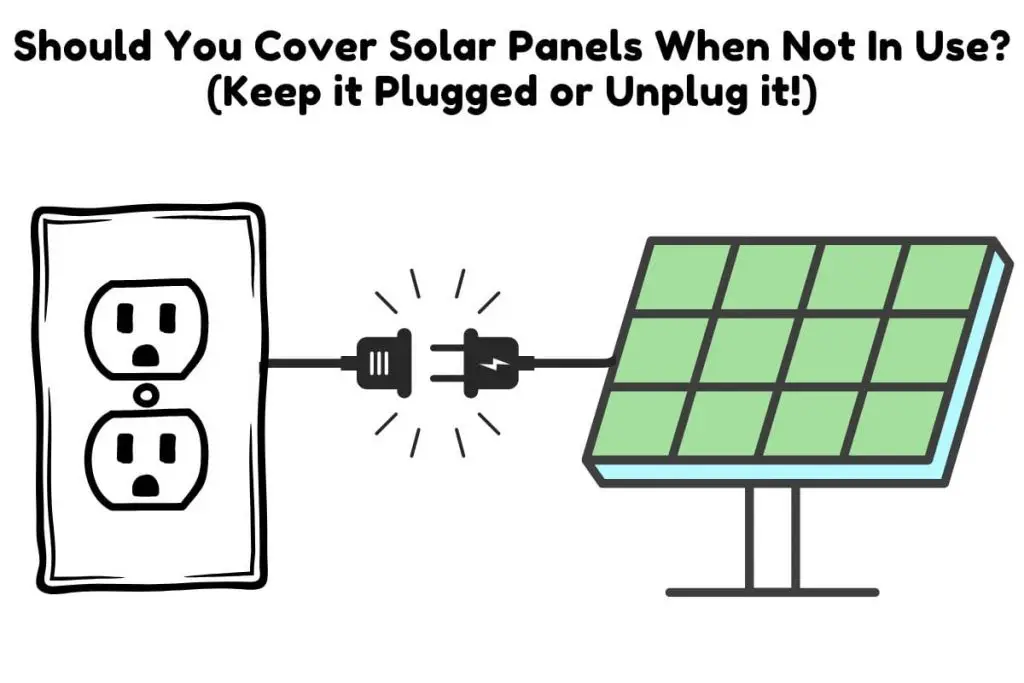Good size solar panels like the ones used for residential solar systems have an average cost of $300 each. Multiply that by between 15 to 20 and then add in the cost of other components like inverters, charge controllers, and batteries and the cost of a solar system can easily break the $20,000 mark.
Fortunately, there are solar tax incentives that reduce the costs by up to 30%. With that being said, you still want to do everything you can to protect what is an expensive piece of equipment. Today, we’ll explore a few ideas around that.
Specifically, we will look at two popular methods for safeguarding solar panels. We will look at what impact disconnecting and covering solar panels has and whether you need to do this.

Do I Need To Cover My Solar Panels? Practical Use Cases!
Covering solar panels is not necessary. This is a largely optional measure a solar panel owner can take to provide some extra protection.
On a side note! If you’re in need of a reliable and high-performance portable solar panel, We strongly recommend the Jackery SolarSaga 100W Portable Solar Panel (Amazon Link).
With a high conversion efficiency and foldable design, this solar panel is easy to transport and set up, making it perfect for outdoor activities like camping, hiking, and RV trips.

The US solar cell technology used in this panel ensures that you get the most efficient and reliable solar charging possible.
There is also a 60W option that is more affordable (Amazon Link)
But why would you want to cover your solar panels and does it make sense to do so? To answer these questions let’s look at some possible use cases.
Protection for a seasonal home
A seasonal home could be something as simple as a cabin. This second home may be used for short periods of the year and left vacant the rest of the year. If that second home has solar panels, that means they are generating energy for an empty home for six to nine months of the year.
While having solar panels working even while you are not there does not damage or harm them, in this case, it might make sense to have them covered.
Solar panels experience degradation when exposed to light. While this is a very small effect, no more than 0.8% per year, why let it affect solar panels that are not in use? Source
Covering your solar panels when you’re away is even more pertinent if you live in a state prone to hurricanes or heavy hail storms like Florida or Colorado. Here too, you might want to consider using covers if your home is mostly vacant.
For the most part, this is the best use case for doing something that provides a small benefit. With that being said, there are a couple of reasons why you don’t need to worry about covering solar panels.
Solar panels are durable
Considering the conditions in which solar panels are used, they are amazingly strong. They hold up quite well against heat, cold, and even hail storms.
Solar panels can withstand wind speeds of up to 120 miles per hour. Temperatures on a roof can go as high as 84°C in the summer. Not only can solar panels withstand those temperatures, but they can also absorb some of that heat and keep a home cooler. Source
Solar systems are intelligent
Solar systems can regulate themselves without human input. As soon as the battery in a solar system is fully charged, the charge controller regulates energy flow to prevent overcharging. Similarly, excess energy in a system is exported to the grid if you’re not using it.
There is no need to worry the system will somehow damage itself if it’s producing energy that is not being used.
Is It Safe To Cover Solar Panels?
Covering solar panels is safe if the right materials are used. There are several types of materials like canvas or tarpaulin that can be used or adapted as covers. Other types of materials like certain plastics may not be suitable because of the heat generated by a solar panel.
Covers like net mesh can be used to keep pests like nesting birds out. They can also be used to reduce the energy production in a solar panel. In this case, the cover would allow some light to get through, unlike a cover that completely blocks out light.
Is It Ok To Leave Solar Panels Unplugged?
Solar panels can be left unplugged without any risk of damage. An extra safety precaution to take with unplugged solar panels is to tape the ends of the connectors or leads.
It’s fairly common practice to disconnect solar panels that are not in use. While this is also not necessary, there are certain precautions you should take if you decide to.
- Do not disconnect solar panels during peak production hours. These are the mid-morning to early afternoon hours when the solar panels are producing the most power. It’s much safer to disconnect in the early morning or late evening when there’s less power.
- Ensure the voltage on the solar panels is zero or near zero by switching off the solar system at the AC and DC switches.
What Happens To A Solar Panel When Not Connected?
Even while a solar panel is disconnected, it still produces a voltage if exposed to light. It does not, however, produce a current for as long as there is no load. Current only flows through a circuit. A circuit is formed only when a load is connected. A disconnected solar panel will experience a slight temperature rise.
Solar panels work as the energy source in a circuit. This circuit forms a system that has solar panels connected to a battery or inverter. The batteries in a solar system store the energy produced by solar panels. An inverter converts the DC energy produced into AC energy that is used in home appliances.
When a solar panel is disconnected it will still produce DC energy but because it is not connected to anything, the energy has no outlet.
The performance of a solar panel is usually assessed while it is not connected. This could be before installation or troubleshooting a fault in the solar system. In this case, the open circuit voltage and short circuit current of the solar panel is checked. This gives you the voltage and current of the solar panel which you can then check against the manufacturer’s given ratings.
A large discrepancy between your measure and the manufacturer’s rating will indicate a possible defect in the solar panel. Typically, there shouldn’t be a difference of more than 10%.
For more on this, check out our post “Common Basic Solar Panels Malfunctions & Troubleshooting; Voltage But No Current!”

